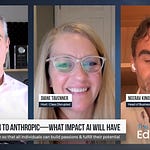On this episode, John Bailey, who advises on AI and innovation at a number of organizations, including the American Enterprise Institute, Chan Zuckerberg Initiative, and more, joins me and Diane Tavenner. We discuss AI’s potential to democratize access to expertise, weigh the costs and benefits of its efficiency-boosting applications, and consider how it will change skills required for the workforce of the future.
Michael Horn: Hi, everyone. Michael Horn here. What you’re about to hear is a conversation that Diane and I recorded with John Bailey as part of our series exploring the impact of AI on education, from the good to the bad. Here are two things that grabbed me about this episode that you’re about to hear. First, John made the point that this technology is really different from anything we’ve seen before. Specifically, how these large language models could, from the get-go, produce artifacts of work that would rival what an entry-level person in a variety of professions would create. And how we’re just scratching the surface of their capabilities. And most people don’t even realize that yet. So what could this mean for education? Second was John’s observation that just because we can do something faster doesn’t mean it’s being done better. Said differently, making the wrong work more efficient isn’t necessarily the right solution.
Now, when we finished up the interview, I had several reflections. But one I wanted to share with you now is this. John’s big framing is that through AI, everyone now has access to an expert in virtually every field. So if the internet democratized access to information, the analogy essentially is AI is democratizing access to expertise. But I’m curious if someone isn’t as skilled or knowledgeable or experienced as John, would they know what to do with or how to use such an expert at their fingertips? I’m excited to be in conversation with Diane for more sensemaking after we’ve talked with a number of people. And we’d love to hear your thoughts and reflections. So please, please share, whether over social media or by dropping us an email through my website at michaelbhorn.com. But for now, I hope you enjoy this conversation on Class Disrupted.
Diane Tavenner: This is Class Disrupted, season six, and the first. I know. Can you believe it? The first of our AI interviews. And we, in this case, we have the first best person, John Bailey, as our guest. Hey, Michael.
Michael Horn: Hey, Diane. Good to see you.
Diane Tavenner: It is always great to see you. There’s so many things we could talk about. But I’m really eager to jump in today to our topics. We’re going to go there right away. When we kicked off last season of this podcast, Class Disrupted, we said that one of the things that we really wanted to delve deeper into was our curiosity around AI. And it’s hard not to be curious about AI right now. In our most recent episode, we were pretty straightforward about kind of where each of us are at this point in time and our understanding and our perspectives. And we overviewed some of the kind of current debates that are taking place specifically around education and AI. And today we get to go deeper with someone who, I think you’ll agree with me, frankly, knows a lot more about AI than both of us.
Michael Horn: So I agree with that. I think it’s very fair. It’s one of the many reasons I’m excited for this conversation, because, as you said, it’s going to be the first of many where we bring folks on who, frankly, have very different views from each other around the impact of AI, sometimes from ourselves as well. And so to start this, we’re welcoming back someone to the show who’s been with us, I think, twice before. So this is like a three peat, if you will. So he’s clearly one of our favorites. None other than John Bailey.
John Bailey: It’s so, so good to be on. Congrats. Six seasons. That’s huge.
Michael Horn: Yeah, we’re still kicking, right?
Diane Tavenner: Thank you. And just in case anyone has missed John previously, quick, quick background here. John’s served in many, many posts in the state and federal government around education and domestic policy more generally. He’s a fellow at AEI. He holds numerous posts supporting different foundations. I could go on and on and on, but what some people might not know, John, is that you originally entered education as an expert on technology and ed. And, you know, we’ll hear that expertise coming through because you have gone deep in the world of AI and how it’s going to impact education, and so, welcome. We are so excited to have you back.
John Bailey: Oh, my gosh, I’m so excited to be here, and I just admire both of you and I’ve learned so much from you. So it’s so good to be on the show today.
John’s Journey to Education AI Work
Diane Tavenner: Well, before we get into a series of questions we have for you, we’d love to just start with how, I guess how. And maybe it’s a how/why did you go so deep into AI specifically? We know you have a lot of experience with sort of frontier models, and maybe you can describe that term for us as well as we sort of begin this conversation. But tell us how you jumped into the deep end and come to this conversation.
John Bailey: It’s such a good question. And it’s also like, my point of entry into this was interesting because, as you mentioned, I’ve been involved in a lot of technology and policy intersections for a number of years, including in education. And if I have to admit, like, I’ve been part of a lot of the hype of, like, we really think technology can personalize learning. And often that promise was just unmet. And I think there was, like, potential there, but it was really hard to actualize that potential. And so I just want to admit up front, like, I was part of that cycle for a number of years. And. And then what happened was when ChatGPT came out in December of 2022, everyone had sort of like a moment of ChatGPT, and for me, it wasn’t getting it to write a song or, you know, a rap song or. Or a press release. It was. I was sitting next to someone with a venture team and I said, what is, like, what is an email you would ask an associate to do to write a draft term sheet? And she gave me three sentences. I put it in ChatGPT and it spit back something that she said was a good first draft, good enough for her that she would actually run with it and edit it. And I was like, oh, this is very different. And then it just sort of started this process of seeing, like, what else could it do? And it just became insanely fun to kind of play with it. And then I was posting a lot of this on Twitter, and that caught the attention of some of the AI companies. And then they gave me early access. So I got to play with something called Code Interpreter for OpenAI, which was the ability of analyzing spreadsheets and data files, and then did some work with Google beta testing, Bard, and a handful of other things as well. And so I get to work with some of the companies now on safety and alignment testing, but also seeing kind of a little bit what’s over the horizon, Google Notebook LM I’ve been playing with for the better part of Over a year and giving them some feedback on it. So I think what’s happened though is that for me this feels very, very different from all the other technologies I’ve been exposed to at least over the last 20 years. And that has caught my excitement. I’ve rearranged my entire work portfolio to spend more time on this, just because it’s rare to see something that I think is going to be so transformative. I don’t think that’s going to be immediate. I think that’s going to play out over years and over decades. But also just the pace at which this technology is improving and new capabilities are being introduced is something like I’ve never experienced. In just the last two weeks of December, you saw so many announcements from OpenAI and Google that you can’t even wrap your heads around it. So better models that do deeper reasoning did not get a lot of attention. But OpenAI released Vision Understanding so now you can use your camera. And so I walked around a farmer’s market and it analyzed all the produce and the meats and it was giving me recipes on the fly.
Listen to this episode with a 7-day free trial
Subscribe to The Future of Education to listen to this post and get 7 days of free access to the full post archives.












